2 Feb 2022 | Europe and Central Asia, News and features, Russia, Ukraine
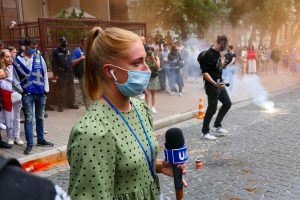
A journalist covering a demonstration in Kyiv, Ukraine, August 2020. Credit: Oleksandr Polonskyi/Shutterstock
While media crews from around the world are arriving in Ukraine to cover the situation amid a build-up of Russian troops on Ukraine’s border, local journalists are trying to overcome the many obstacles that stand in the way of their media freedom. The working environment is challenging: from disinformation campaigns and orchestrated propaganda to limited resources in newsrooms, attacks on journalists and the often inadequate response of law enforcement.
In Ukraine, the armed conflict has been going on for almost eight years, ever since Russia annexed the Crimean peninsula and put armed forces in eastern Ukraine. In the wake of this, the Ukraine government has trod a difficult path as they have tried to balance media freedom and plurality against the risks that could be posed from an unregulated media landscape. They have not always made the right decisions. For example, one year ago, President Volodymyr Zelensky imposed sanctions that resulted in three TV channels associated with a pro-Russian politician – ZIK, NewsOne and 112 Ukraine – being taken off air. While some Ukrainian media experts supported the move, others saw it as repressive and criticised the authorities because they bypassed legal procedures and did not provide enough information to justify emergency restrictive measures.
At the same time Ukraine does face a real problem when it comes to misinformation. The ecosystem of online platforms and various social media in Ukraine that are being used by both state, influential non-state and political players is extensive. According to a report from Freedom House, paid commentators and trolls have proliferated Ukraine’s online public space. In many cases, these online platforms are anonymous and are spreading and amplifying messages that benefit the Russian government and seek to destabilise the Ukrainian political landscape. Many of these accounts have tens of thousands of subscribers and are being used by interested parties from inside or outside the country. They spread anything from malicious disinformation to banal clickbait to attract news audiences and they also attack journalists. According to the Institute of Mass Information survey, the majority of Ukrainian journalists have experienced some form of cyberbullying.
Independent journalists suffer from the damage related to misinformation, and their day-to-day duties are not easy either. Media workers in Ukraine are often defenseless against attacks and police responses to them can be inadequate. About 100 Ukrainian media workers were physically assaulted in 2021, revealed Ukraine’s National Union of Journalists (NUJU). This is hardly an improvement on the last year, when 101 journalists were physically assaulted.
Despite the tightening of legislation regarding accountability for attacks on journalists, the efficiency of the law enforcement system remains low, so the perpetrators often go unpunished. Several murders of famous journalists have not yet led to the punishment of those responsible. In 2019, Vadim Komarov, a journalist and blogger from Cherkasy, was violently attacked by an unknown person in a city center. Komarov was known for his exposes of corruption. He died in hospital after several months in a coma. Police still haven‘t found the perpetrator and the investigation remains open.
Another frightening example of the violence that Ukrainian journalists encounter in their work is the murder of Pavel Sheremet in 2016. Sheremet, who was a harsh critic of Ukrainian, Belarusian and Russian authorities, died in a car explosion in downtown Kyiv. Three years later, after a new president came to power, the police detained five suspects. The trial is ongoing and as yet no one has been sentenced.
Sometimes difficulties arise from where they were not expected. For example, the NUJU says that rising prices for natural gas and fuel have caused many regional newsrooms to be unable to heat their editorial offices.
It’s hardly a surprise that about 48% of journalists reported self-censoring in the Ukrainian media, according to a 2019 study by the Ilko Kucheriv Democratic Initiatives Foundation. Topics related to patriotism, separatism, terrorism and Russia were the ones most avoided. And almost 65% believe that the war has increased self-censorship. Then there are those who literally get told what to say. For example, former employees of the state TV channel DOM have spoken about censorship by the Office of the President of Ukraine, which has demanded positive news about the president and his initiatives.
Given all of these attacks, how exactly can Ukraine’s journalists hold power to account?
And yet, thanks to the efforts of the journalistic community there is progress, the head of the NUJU Sergiy Tomilenko believes. Representatives of media and journalistic organisations have consistently raised concerns about the safety of journalists publicly and in face-to-face meetings with government officials for years. According to Tomilenko, the police have begun to investigate faster than before, and now see attacks against journalists as what they are – threats to the very nature of their work.
Media freedom and pluralism is crucial in general and no more so now. We need to see more positive change and fast.
28 Aug 2020 | Belarus, News and features
[vc_row][vc_column][vc_single_image image=”114603″ img_size=”full” add_caption=”yes”][vc_column_text]“As long as you don’t kill me, new elections won’t happen,” Belarusian president Alexander Lukashenko told workers at the MKZT truck factory in Minsk, the capital city of Belarus last week.
The speech followed a presidential election on 9 August in which Lukashenko claims to have won a landslide victory to serve for a sixth term with just over 80% of the vote, a result heavily contested domestically and internationally. Mass anti-Lukashenko protests have been held across Belarus since the results, with many people saying the result was fraudulent and a result of vote-rigging, while the UK government does not recognise the result and The Council of EU stated that the election was “neither free nor fair”.
Belarus has been ruled by Lukashenko since 1994, after he became the country’s first president in the wake of Belarusian independence from the USSR in 1991. He rules the country with an iron fist; Belarus is the last country in Europe which still uses the death penalty, and many forms of freedom of expression are tightly governed. The state controls the media to the extent that Belarus is ranked at 153 out of 180 countries on the World Press Freedom Index, one of the lowest rankings in the world, not just in Europe. How did a country, freed from the grips of Soviet Union and starting afresh with a new constitution, end up ruled by a man internationally dubbed as “the last dictator in Europe”?
Two years into his presidency, Lukashenko set about dismantling the aspects of the constitution which would have allowed for genuine democracy. In 1996 he demanded a referendum which asked the public to vote on extending his first term from five to seven years and to increase his powers. After the vote went in his favour (although the international community questioned the validity of the result), Lukashenko dissolved the elected Supreme Soviet parliament, who had resisted the referendum, and installed a handpicked collection of loyalists to hold seats in government, effectively wiping out any political opposition and obstacles to authoritarian control.
Another referendum in 2004 took Lukashenko’s desire to retain presidency a step further. Nearing the end of his second term, the maximum number allowed by the constitution, a referendum was held which asked the public to allow him to run a third time. When this passed with an apparent large majority, the limit on the number of terms a president could sit was essentially abolished and Lukeshenko’s grip on power tightened.
In the years between these two pivotal moments in Belarusian history, Index reported from the ground in Belarus about the deterioration of freedom of expression under an evermore authoritarian regime.
A 1997 Index article chronicling attacks on freedom of expression around the world reported that Belarusian journalist Pavel Sheremet was still in the hands of the Belurusian KGB. A “vocal critic of Lukashenko’s government”, Sheremet had previously been stripped of his journalist accreditation for “insulting the ‘president and nation of Belarus’.” Fifteen journalists who picketed for his release were also arrested and detained in a clear signal to the citizens of Belarus: any form of dissent, or support of a dissenter, would be aggressively crushed.
A 1999 report by Michael Foley confirmed this trend; he found that journalists in Minsk were worse off than those in any other former Soviet state. Just five years into Lukashenko’s rule, Foley reported that “the electronic media is almost totally state-owned and the print media is forced to use state owned printing plants”.
As Lukashenko won the election in 2006, securing a third term that never should have been, human rights and freedom of expression in Belarus continued to deteriorate.
LGBTQ rights were and continue to be all but non-existent, with gay marriage constitutionally banned and few legal protections afforded to LGBTQ people. Freedom of assembly has been violated by the authorities’ attempts to prevent Gay Pride events from taking place. A 2000 parade was banned by authorities just hours before the fact, and in 2006 a conference on human rights and gay culture was cancelled after its organisers were arrested.
In 2011, months after Lukashenko’s fourth election victory, James Kirchick reported for Index from Minsk that the regime still had a grip on the media: “the Lukashenko regime has effectively rendered political opposition moot through its near domination of the press. It has silenced critical voices through two means: state control of mass media outlets like television and radio, and onerous registration laws that make the practice of independent journalism a dangerous pursuit”.
In the 10 years since the 2010 election, there has been another election, taking place in this landscape that is weighed heavily in Lukashenko’s favour. As Andrei Aliaksandrau reported for Index in 2017, TV stations continue to be state-owned and Lukashenko continues to rule as a dictator. The 2015 election, similarly to those preceding it, was dogged by controversy and suggestions of an undemocratic process. “The [2015] election process was orchestrated, and the result was preordained”, said Miklós Haraszti, The United Nations Special Rapporteur on human rights in Belarus.
The 2020 election result has seen scenes of protest unlike Belarus has experienced before. After 26 years of propaganda and authoritarian leadership, Belarusians appear to be prepared to tolerate it no longer. Journalists have gone on strike, refusing to be used as propaganda tools. Lukashenko shut down the internet across most of the country in the days following the election, in an attempt to quash dissent, and horrific accounts of intimidation and torture have come out of the country, as our interview with the wife of an arrested protester reveals. But now almost three weeks on the people are still making their voices heard. Svetlana Tikhanovskaya, Lukashenko’s only opponent during the election after other contenders were picked off, spoke to the European parliament’s foreign affairs committee from Lithuania where she has fled to escape violence: “The intimidation didn’t work. We will not relent.” Could this finally mark the end of Europe’s last dictator? We all hope so. [/vc_column_text][/vc_column][/vc_row][vc_row][vc_column][/vc_column][/vc_row]
2 Dec 2019 | Artistic Freedom Commentary and Reports, Azerbaijan, Azerbaijan Incident Reports, Belarus, Belarus Incident Reports, News and features, Russia, Turkey, Ukraine
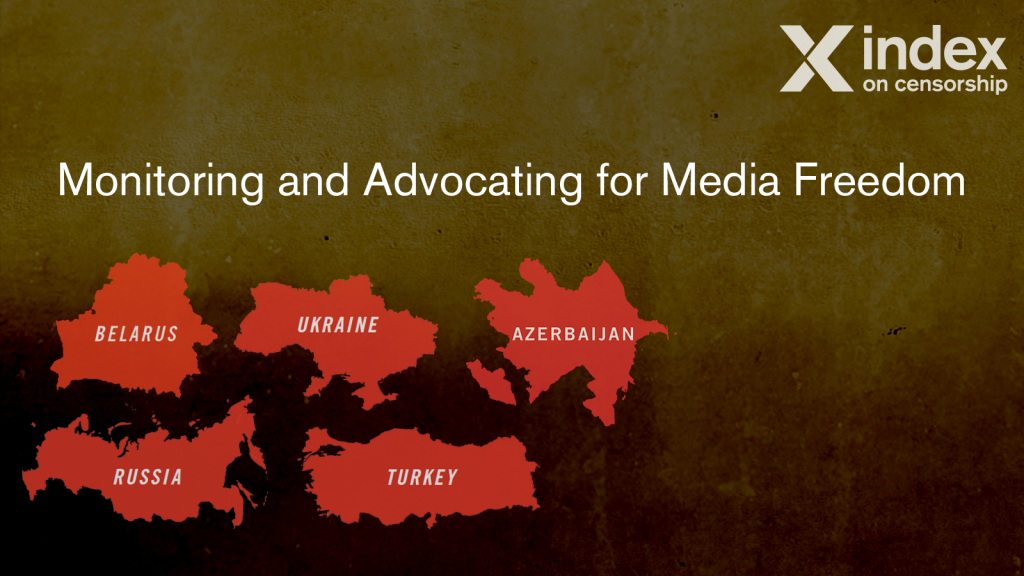
Index on Censorship’s Monitoring and Advocating for Media Freedom project monitors threats, limitations and violations related to media freedom in Azerbaijan, Belarus, Russia, Turkey and Ukraine. Previously these countries were also included in the Mapping Media Freedom project, which Index incubated and managed between 2014 – 2018.
This report summarises policy recommendations based on analysis since April, 2019. The recommendations are based on research by in-country correspondents and Index staff. Country reports published by the project since April are available on the project webpage.
After a brief background section, the report sets out key policy recommendations that apply to all the project countries, followed by key recommendations for each project country.
Background
It is essential that media freedom groups and international organisations continue to monitor, verify and document threats, limitations and violations related to media freedom in Azerbaijan, Belarus, Russia, Turkey and Ukraine, continue to raise awareness about the challenges and to advocate for change. Media freedom is severely restricted in all these countries and journalists are under great pressure.
Violence against journalists; misuse of counter-terror and security legislation to silence journalists; travel bans that isolate journalists and impact them professionally; failure to investigate violent crimes against journalists and silencing and punishing journalists through defamation and insult laws – all these are familiar tactics and increasingly common. In more recent years the introduction of restrictive internet-related legislation, such as in Russia, has opened a new frontline in the fight to safeguard media freedom.
RECOMMENDATIONS FOR ALL PROJECT COUNTRIES
- Governments and the EU must take a stronger stand for media freedom
Governments and multilateral groups, in particular the European Union (EU), must take a strong stand in defence of media freedom and journalists, both in their bilateral relations with the project countries and in multilateral processes. Governments and the EU should ensure that issues such as proposed or existing legislation that restricts media freedom, violence against journalists and failures to investigate crimes against journalists, form part of the agenda in strategic bilateral and multilateral discussions.
Countries that have a version of the Magnitsky Act (in the EU, this includes Estonia, Latvia, Lithuania and The Netherlands) should consider making use of this legislation in cases where media freedom and the safety of journalists are at stake. Countries that have not yet introduced such legislation should consider doing so. The UK should put its Magnitsky amendment into use.
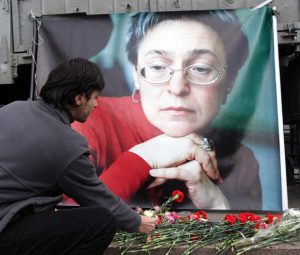
A man lays flowers near the picture of murdered journalist Anna Politkovskaya, during a rally in Moscow, Russia, 7 October 2009. CREDIT: EPA / Alamy Stock Photo
Impunity is a major challenge in all the project countries. In Azerbaijan, the death of freelance journalist Rafic Tagi, who died in hospital after a stabbing in 2011, has never been investigated properly. Belarussian cameraman Dzmitry Zavadski disappeared in 2000 on his way to meet journalist Pavel Sheremet, later killed in Ukraine in 2016. Zavadski’s body was never found.
The instigator of the 2006 contract killing of investigative journalist Anna Politkovskaya in Russia is still not known, nor is the motive. In 2018 the European Court of Human Rights found that the Russian authorities had failed to carry out an effective investigation into her killing. Turkey failed to investigate the death of editor Rohat Aktaş, killed when he was covering hostilities between Kurdish separatists and Turkish forces in 2016.
Ukrainan journalist Pavel Sheremet was killed by a car bomb in Kyiv in 2016 and, despite statements from the authorities that the case is a priority, there has been no progress. All the project countries should commit to investigating unsolved killings of journalists and should implement the guidelines in recommendation CM/Rec(2016)4 of the Committee of Ministers of the Council of Europe.
In relation to impunity, the guidelines envisage that when investigations and prosecutions have not resulted in justice member states can consider establishing special inquiries or independent specialised bodies, and that the latter could involve participation by respected media and/or civil society figures.
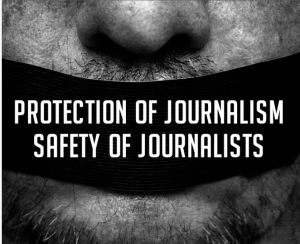 Council of Europe member states must engage fully with the platform for journalism
Council of Europe member states must engage fully with the platform for journalism
Council of Europe member states must engage more actively with the Council of Europe’s Platform for the protection of journalism and safety of journalists. The partner organisations of the platform, which include Index on Censorship, should continue to use the platform to raise awareness of media freedom violations and threats to journalists. This should include advocating for states to respond to all alerts communicated to the platform.
The overall response rate from states in 2018 was only 39%. It is also important that states provide substantive replies to alerts and engage in follow-up dialogue with the partner organisations. The platform is an underused mechanism, with potential to achieve more. Partner organisations can also be of assistance to member states that are willing to engage fully.
Belarus is not a member of the Council of Europe, but other international organisations and processes, such as the special procedures of the United Nations human rights council, should be engaged to follow up cases and issues in Belarus.
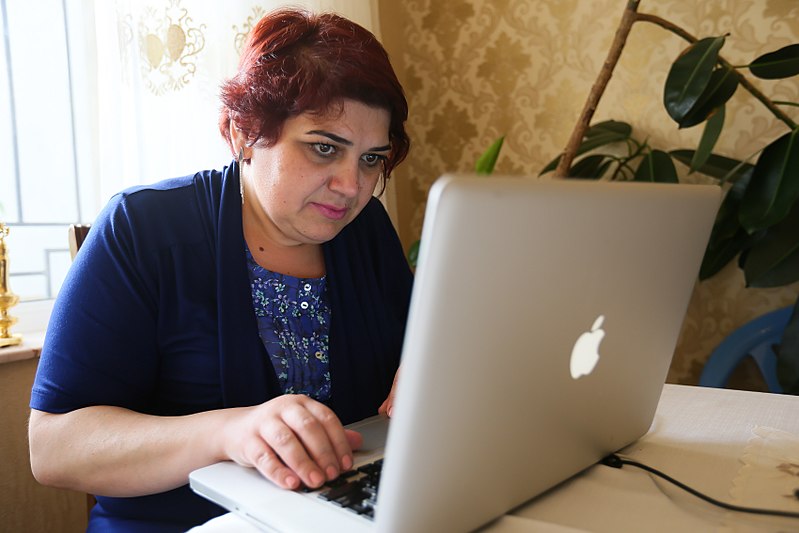
Azerbaijan must halt its use of travel bans for journalists including Khadija Ismayilova
AZERBAIJAN
- The EU must defend media freedom in negotiations with Azerbaijan
The EU must use its influence to defend media freedom and journalists in Azerbaijan. Negotiations on an agreement to replace the EU-Azerbaijan Partnership and Cooperation Agreement, in place since 1999, are at an advanced stage and will need to be brought to a conclusion by the new European Commission. It is extremely important that the EU raises media freedom and human rights in these negotiations.
In 2018, the European Parliament adopted a resolution which recommended that the EU should make deepening of relations with Azerbaijan conditional on respecting democratic values and human rights, and that it should ensure that Azerbaijan frees its political prisoners (including journalists such as Afgan Mukhtarli) before the negotiations on a new partnership agreement are concluded. Mukhtarli remains imprisoned.
Azerbaijan must refrain from targeting journalists’ online activities, including through call hacking, internet blocking and distributed denial-of-service (DDoS) attacks. In October, internet blockages and disruption to mobile phone services were reported in central Baku in connection with ongoing protests. Several journalists were also detained or subjected to physical violence during the protests. Social media platforms such as YouTube should respect Azerbaijani users’, including journalists’ right to seek, receive and impart information. Platforms should implement terms and conditions consistently and transparently, including when dealing with harassment of journalists by alleged state-sponsored trolls.
Azerbaijan must halt its use of travel bans for journalists. For example, the well known journalist Khadija Ismayilova is currently under a travel ban. OSCE Media Freedom Representative Harlem Désir has stated that it is a serious hindrance to her work as a professional journalist.
BELARUS
- Amend the law on mass media
Belarus must amend the law on mass media. The legislation currently requires journalists, including freelancers, who work for media outlets registered outside Belarus to obtain accreditation from the foreign affairs ministry. This has led to journalists being fined repeatedly. At a very minimum, Belarus must urgently establish procedures that enable journalists to appeal rejected accreditation requests.
- Other governments must signal that restrictions are not acceptable
Other governments must make it clear to Belarus that restrictive and repressive actions against journalists will not be tolerated. This applies to the requirements for accreditation for journalists working for non-Belarussian media outlets above, but also to the practice of detaining journalists for short periods. Some observers have credited Belarus’ tendency to impose fines on journalists or to detain them for short periods – rather than sentence and imprison them – as an attempt to build alliances in the West at a time when relations with Russia are weak. Other governments need to signal clearly it is not acceptable.
- Train journalists in human rights and United Nations procedures
In the case of Belarus, which is not a member of the Council of Europe, it is important that support and training aimed at enabling journalists to defend their rights includes training on other international organisations and processes, such as the special procedures of the United Nations human rights council, including the special rapporteur on the situation of human rights in Belarus.
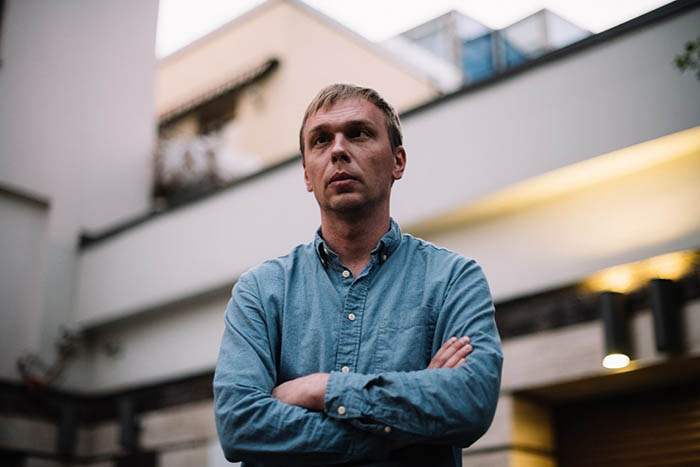
Russia must investigate cases of trumped-up charges against journalists such as Ivan Golunov
RUSSIA
- Halt the extension of foreign agent legislation to individual journalists
Russia must refrain from finalising the legislative changes that would extend the scope of “foreign agent” to individual journalists. Existing problematic legislation already requires media outlets that receive funds from abroad to register as foreign agents. At the time of writing the Duma has approved changes that would extend this to individual journalists, including freelance journalists and bloggers. Any one of these receiving payments for services, or a salary from abroad, would need to register with the ministry of justice. All published work would need to display a “foreign agent” label. This legislation should not proceed, and existing legislation that labels media outlets as foreign agents should be reviewed.
- Ensure access for journalists to court proceedings
Access to court proceedings is a frequent problem for journalists. As stated in Opinion No. 8 of the Consultative Council of European Prosecutors: “Transparency in the performance of the prosecutor’s duties is an essential component of the rule of law, and one of the important guarantees of a fair trial. Not only must justice be done, but it must also be seen to be done. In order for this to be possible, the media should be able to provide information on judicial, criminal or other proceedings” (paragraph 30). The authorities must review existing processes for compliance with international standards.
- Investigate cases of trumped-up charges against journalists
The authorities must thoroughly investigate cases of trumped-up charges against journalists and ensure that the instigators are brought to justice. Recent incidents include the high-profile case of Ivan Golunov, arrested for possession and trafficking of drugs, and what appears to be a fake letter sent in the name of Nikita Telizhenko with the aim of discrediting him.
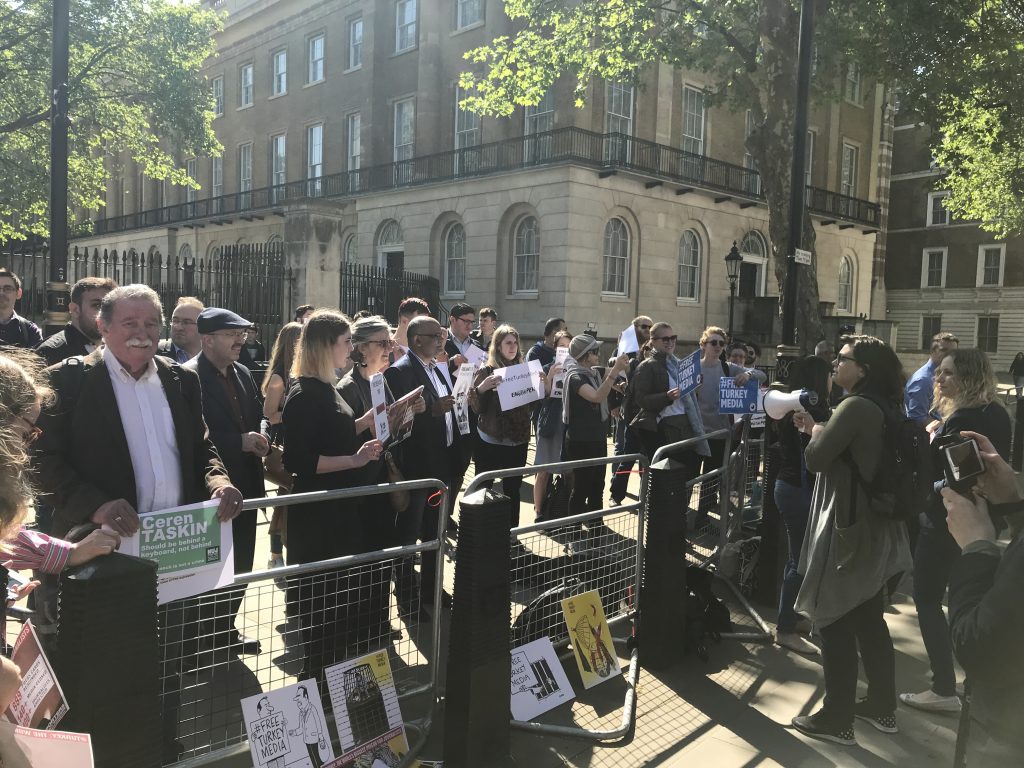
Index on Censorship magazine editor Rachael Jolley leads chants in support of Turkey’s jailed journalists ahead of Turkish President Erdogan’s visit to Downing Street in May 2018
TURKEY
- Other governments should not support Turkey’s judicial reform strategy, at least not in its current form
The judicial reform strategy (JRS), launched in May, 2019, will not achieve any meaningful change, at least not in its current form. Turkey’s judicial system is not independent: it is overloaded with cases, many which concern journalists, and it has been undermined through the large-scale dismissal of judges. It is extremely important that other countries and international organisations scrutinise the judicial reform strategy, and make it clear that in its current form it is completely inadequate when it comes to addressing the enormous structural problems of the judiciary.
- Implement the recommendations of the United Nations special rapporteur
In May 2019, the United Nations special rapporteur on the promotion and protection of the right to freedom of opinion and expression published a follow-up report to an earlier visit to Turkey in 2016. The rapporteur had made a series of recommendations in 2016, which included releasing jailed journalists and reversing the closure of media outlets. The follow-up report found that Turkey had either failed to implement or had contravened all the recommendations, with the exception of one (lifting the state of emergency). Turkey should urgently implement all the recommendations made by the United Nations special rapporteur.
- Support trial observation
Diplomatic representations and international organisations, including the EU, need to support observation of trials that involve journalists and media outlets. High-profile trials in central locations can be well-attended by observers, but coverage of trials in remote locations is more limited. Support can include sending representatives to follow trials and/or financial support for organisations that monitor trials.
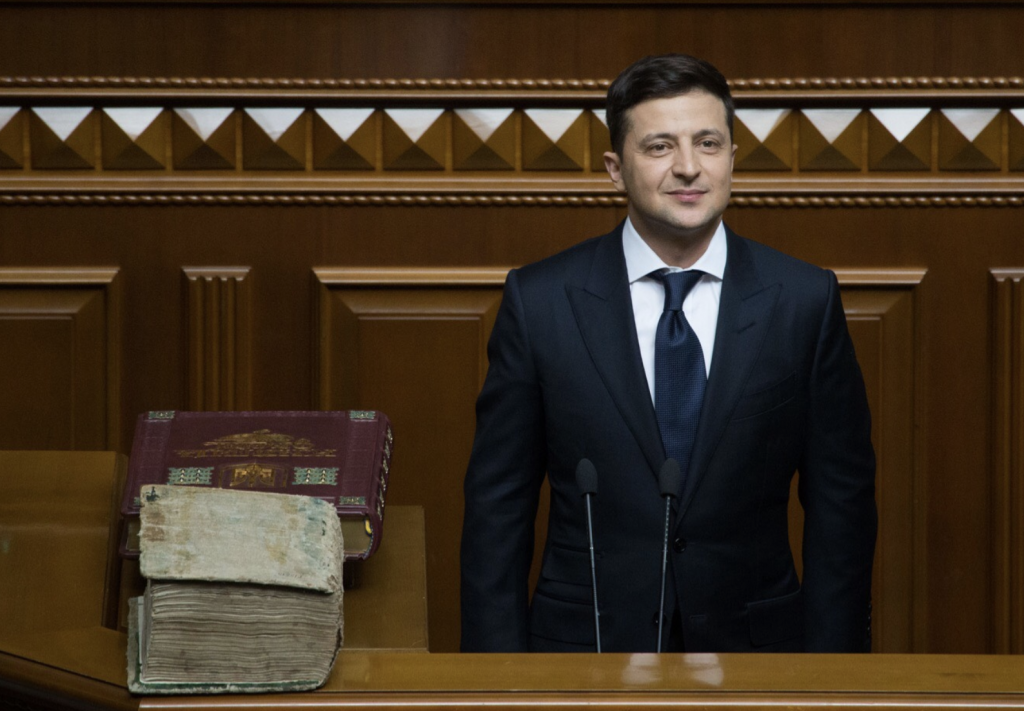
Ukraine President Volodymyr Zelenskiy must engage with the media. Photo: Wikimedia
UKRAINE
- The government must review state support for far-right groups associated with extremism
The government needs to undertake an independent and transparent review of state support, including financial support for far-right groups associated with extremism. The review should involve international experts. It should include investigating the possibility of state security force collusion with paramilitary and extremist organisations and thorough investigations of alleged involvement in violence against journalists, such as the unsolved murder of Oles Buzina.
- Elected representatives must engage with the media
President Volodymyr Zelenskiy reportedly held a 14-hour press conference in October, attended by 300 journalists. Whether it signals a new era in the relationship between Ukraine’s elected representatives and the media remains to be seen. The failure of the president and lawmakers to engage meaningfully with the media in the past has been a challenge for journalists and this needs to change.
- Invest in the public service broadcaster
In the highly divisive media landscape, the role of the public broadcaster is extremely important. Ukraine’s public broadcasting company is severely underfunded and currently has a very small audience. As Index on Censorship outlined in its Demonising the Media report a year ago, a significant but underreported trend in the region is the threat to public broadcasters. A number of national broadcasters in the EU and neighbouring countries were brought under closer government control in 2014-18. Ensuring both sufficient funding and editorial independence are crucial in ensuring the public’s right to know is defended.
23 Jul 2019 | Media Freedom, Monitoring and Advocating Coverage, News and features, Ukraine
[vc_row][vc_column][vc_single_image image=”108001″ img_size=”full” add_caption=”yes”][vc_column_text]
The majority of violations in Ukraine catalogued by Index on Censorship’s Monitoring and Advocating for Media Freedom project from 1 February to 30 June 2019 were categorised as physical assaults, attacks to property or blocked access. Most frequently, these actions were taken by agents of the state — whether law enforcement or other governmental structures.
The Monitoring and Advocacy for Media Freedom project has recorded 16 incidents in which journalists have been subjected to physical assaults, and 17 incidents in which journalists has their equipment and property damaged since February 2019, 4 of which are in both categories. The project’s numbers are corroborated by the National Union of Ukrainian Journalists (NSJU), which recorded 36 incidents targeting journalists since 1 January 2019, including physical assaults and attacks on property, as part of their Index of Physical Safety of Ukrainian Journalists.[/vc_column_text][vc_row_inner][vc_column_inner width=”1/4″][vc_icon icon_fontawesome=”fa fa-times” color=”black” background_style=”rounded” size=”xl” align=”right”][/vc_column_inner][vc_column_inner width=”3/4″][vc_column_text]Index on Censorship’s Monitoring and Advocating for Media Freedom project documents, analyses, and publicises threats, limitations and violations related to media freedom in Azerbaijan, Belarus, Russia, Turkey and Ukraine, in order to identify possible opportunities for advancing media freedom in these countries. These limitations, threats and violations, affect journalists as they do their jobs, so the project’s staff advocate for greater press freedom in these countries and raise international awareness.
The project builds on Index on Censorship’s 4.5 years monitoring media freedom in 43 European countries, as part of Mapping Media Freedom platform.[/vc_column_text][/vc_column_inner][/vc_row_inner][/vc_column][/vc_row][vc_row][vc_column][vc_custom_heading text=”Vadim Komarov murdered” font_container=”tag:h3|text_align:left” use_theme_fonts=”yes”][vc_column_text]The 20 June death of journalist and blogger Vadim Komarov is a severe and frightening example of the violence that Ukrainian journalists encounter in their work. Komarov was attacked with a hammer in the centre of Cherkasy on 4 May. His is the first recorded death of a journalist in Ukraine since the murder of Pavel Sheremet, whose car was blown up in 2016.
Komarov was struck in the head several times by an unidentified individual, in broad daylight, near the town’s busy central market. The assailant then fled. Komarov was found unconscious and bloodied by passers by, who called emergency services. According to the doctors who treated him, Komarov had suffered a grievous open head injury, and slipped into a coma shortly after surgery. He never regained consciousness.
Sergey Tomilenko wrote on Facebook that Komarov’s family and colleagues “don’t feel like there’s (the) necessary attention to this case.” The cause of the murder, said Tomilenko, was Komarov’s journalistic work. “The murder of Vadim Komarov is a crime against all journalists in general,” he wrote. Tomilenko called for solidarity among journalists, because “this topic is important for the survival of a journalist as a profession in Ukraine.”
The police were investigating Komarov’s attack as an “assassination attempt” prior to his death.
Komarov was known for his investigations of corruption among Cherkasy city authorities and the region’s prison system. The journalist had been assaulted in the past: on 7 September 2016, an unknown gunman shot at Komarov in Cherkasy, but the bullet missed him and hit a wall.
The OSCE Representative on Freedom of the Media, Harlem Désir, expressed his deep sorrow following Komarov’s death. “I am deeply shocked by the death of Vadim Komarov, who was brutally attacked last month in Cherkasy and suffered from serious head injuries,” Désir said. “I reiterate my call to the Ukrainian authorities to complete the investigation in a vigorous and swift manner. It is regrettable that about one-and-a-half months after the attack, law enforcement has not yet identified the perpetrators nor reported any progress on the investigation. Violence and attacks against journalists are unacceptable and must stop. Impunity would be a victory for those who wanted to silence Komarov and to intimidate the press. All OSCE participating states should take effective and resolute actions to prevent and end impunity for such crimes.” [/vc_column_text][vc_custom_heading text=”Aliya Zamchynska” font_container=”tag:h3|text_align:left” use_theme_fonts=”yes”][vc_column_text]On 20 June, Aliya Zamchynska, a correspondent for online news outlet Dumskaya, was assaulted and threatened by Yury Reznikov, Dumskaya.net reported. Reznikov is the owner of a cable car next Otrada beach in Odessa.
According to Ukrayinska Pravda, local deputies, civil activists and journalists gathered at Otrada beach to remove an illegal fence restricting public access to the beach. The video recorded by Dumskaya shows Reznikov confronting the group armed with a machine gun and threatening them. “I’m not ready to kill for private property, but I’m ready to shoot [you] in the legs,” Reznikov told them. During the episode Reznikov pushed Zamchynska, who fell to the ground and was injured as a result.
Deputy Olexander Sheremet managed to disarm Reznikov, and the police were called to the scene. They discovered that the gun had been loaded.
This is not the first time that Reznikov and his family attacked journalists and activists. In 2012, his daughter assaulted activist Zoya Melnik in front of her child. In 2014, Reznikov pushed a cameraman for Pervyi Gorodskoi TV channel into a swimming pool with his camera. [/vc_column_text][vc_custom_heading text=”Maria Gural and Volodymyr Tsyganov” font_container=”tag:h3|text_align:left” use_theme_fonts=”yes”][vc_column_text]On 13 June, two reporters from online news site Stop Corruption, Maria Gural and Volodymyr Tsyganov, were assaulted in Priluki, Chernihiv region. The attacker was identified as Olexander Chaly. Chaly is deputy head of politician Boris Prikhodko’s election campaign for Ukrainian Verkhovna Rada, the Institute of Mass Information reported.
According to Stop Corruption, the journalists were trying to access an open event where Prikhodko was meeting with members of the public. The crew were investigating alleged voter bribery and wanted to question the politician.
Olexander Chaly first tried to snatch a microphone from Gural, and then began to assault her. Tsyganov tried to protect Gural and was assaulted as well. As a result of the beating, Gural received a concussion, and Tsyganov ended up with scratches and light injuries. The police arrested Chaly and charged him with “threat or violence against a journalist.” [/vc_column_text][vc_custom_heading text=”Vadym Makaryuk” font_container=”tag:h3|text_align:left” use_theme_fonts=”yes”][vc_column_text]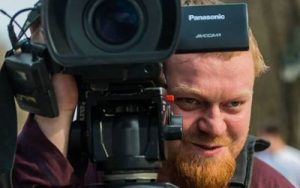
On 7 June, Vadym Makaryuk was physically assaulted during a mass brawl at Barabashovo market in Kharkiv by unknown individuals, Channel 24 reported. Makatyuk is a TV operator for Channel 24 and Visti.News,
A group of unidentified people assaulted the cameraperson as he filmed the altercation at the market. They sprayed tear gas in his eyes, smashed his face, broke his camera and took away his memory card. The clash was between the right-wing National Corps (who are Donbass war veterans) and the merchants of Barabashovo. According to the market administration, their conflict was due to a property dispute.
The journalist was taken to an intensive care unit in a local hospital, where doctors diagnosed a hemorrhagic stroke as a result of a cerebral haemorrhage sustained after the beating.
The police opened a criminal investigation into whether the incident constituted “threats or violence against a journalist”, “obstruction of journalists’ legal activities”, and “robbery”. A court in Kharkiv refused to detain a man involved in the brutal beating, saying that round-the-clock house arrest was sufficient punishment, Interfax-Ukraine reported. The court also sentenced Kozlyuk, a 26-year-old unemployed Kharkiv resident involved in the assault, to one month and 28 days under house arrest. Immediately after the hearing, the suspect’s lawyer said that he would appeal the decision. The prosecutor’s office also announced their intention to appeal.[/vc_column_text][vc_custom_heading text=”Natalia Polishchuk, Maria Petruchyk and Vyacheslav Moroshko” font_container=”tag:h3|text_align:left” use_theme_fonts=”yes”][vc_column_text]On 9 May, customs officers at the Yagodyn border crossing with Poland assaulted Natalia Polishchuk, Maria Petruchyk and Vyacheslav Moroshko, journalists working for Avers TV.
The three journalists were investigating a large shipment of amber, which was alleged to have been smuggled to Poland through the Yagodyn customs station. The reporting crew entered a restaurant where customs agents were attending a party and began asking questions about corruption and the amber smuggling. According to Avers, the officers who were present behaved aggressively and assaulted the journalists. They bruised one journalist’s finger and broke the crew’s camera, 1+1 TV channel reported.
“Two men approached me, they started tugging at me, tore my jacket, hit the cameraperson, hit the camera,” Polishchuk said. Petruchyk reported, “He (my attacker) wrestled my phone out of my hand, used brute force, my hand is damaged, he tore my journalist’s ID off me.” The officers also forcibly took the journalists’ driver’s licenses, car documents and bank cards. A customs officer told one of the journalists he would “bury her”. The journalists managed to film a part of the incident.
The police have opened criminal proceedings on three articles. “It’s about interfering with the professional activities of journalists, robbery and causing intentional light bodily injuries,” Viktor Homol, spokesperson for the National Police in the Volyn region, said. The case is now being investigated by the State Bureau of Investigations.[/vc_column_text][vc_custom_heading text=”Kateryna Kaplyuk and Borys Trotsenko” font_container=”tag:h3|text_align:left” use_theme_fonts=”yes”][vc_column_text]On 6 March, journalist Kateryna Kaplyuk and cameraperson Borys Trotsenko from the investigative TV project Schemes were assaulted in Chabany, a suburb of Kyiv. Schemes’s editor Natalie Sedletska reported the assault on her Facebook page. Sedletska wrote that the journalists had gone to Chabany village council to get information for an investigation on the illegal transfer of public land to private ownership.
The pair were filming at the council’s office, trying to interview the council secretary, when they were assaulted. Their attackers were two deputies of Chabany’s village head, Volodimir Chuprina and Yuri Bondar, as well as Valery Prisyazhny, the head of the public organisation Rozvitok Kyevshiny. In their attempt to prevent journalists from filming, these men injured Trotsenko and broke his camera.
Kaplyuk and Trotsenko called an ambulance. After a medical check-up at a hospital, Trotsenko was diagnosed with a concussion. The journalists filed a complaint with the police, who launched a criminal investigation. [/vc_column_text][vc_custom_heading text=”Lack of “political will“ puts journalists at risk” font_container=”tag:h3|text_align:left” use_theme_fonts=”yes”][vc_column_text]Despite the existence of legislation that aims to protect journalists, the NSJU said that Ukraine is notorious for impunity when crimes against journalists are committed.
Speaking at a conference held by the International Federation of Journalists in October 2018, Sergey Tomilenko, the head of NSJU, said that crimes against journalists had become the norm in Ukraine. He said that every four days there were acts of violence against journalists in the country, from brutal beatings to broken equipment.
In 2017-2018 NSJU recorded 175 physical violations against journalists in Ukraine, including minor acts of aggression and destruction of property.
Artyom Shevchenko, the spokesperson for the Ukrainian Ministry of Interior, reported on 1 March that in 2018, the police opened 258 criminal investigations on interfering with journalistic activity. In January 2019 alone, there were an additional 21 investigations. At the same time, however, only 26 out of the 258 cases related to crimes against media workers were passed on to the court.
“The lack of political will of the country’s leadership to really protect media workers leads to the fact that the attacks are not properly investigated, and those cases which still reach the court do not end with heavy punishment for the attackers”, head of NSJU Sergey Tomilenko told Index on Censorship’s project Monitoring and Advocating for Media Freedom. “Until recently, journalists, particularly investigative journalists, were viewed by officials as threats, and not as an important element of protecting democracy in the country.” Until recently, there has also been a political culture that legitimised humiliating journalists and the media, he added.
Tomilenko said that the NSJU has noticed that ordinary Ukrainians now feel emboldened to physically assault journalists. This is likely due to the toxic attitude toward the press created by government officials, he says. “Over the past year, we have witnessed an active uprising by the authorities–primarily representatives of the President, Petro Poroshenko, and parliamentarians of the political forces close to him–deliberate hostility towards certain journalists and the media, and calls to attack the so-called ‘pro-Russian’ media. This has resulted in the blocking of individual TV channels, the physical attacks on journalists during live broadcasts, parliamentary appeals to stop the broadcasting of individual media, and attempts to adopt draconian laws against the media.”
Tomilenko said that he was hopeful that the hostility toward journalists would abate in the future. “The victory of the new President, Volodymyr Zelensky, who does not use the rhetoric of hostility towards journalists and declares his support of freedom of speech and real political competition in the country, gives (me) hope that the Ukrainian authorities will not be at the forefront of those who reject the rights of journalists and the media.”
The National Union of Journalists of Ukraine has been calling for regular and transparent public reports by law enforcement agencies on the progress of investigations of crimes against journalists. Such reports could be used as a key tool in battling impunity. In addition, the NSJU is recommending special parliamentary hearings on journalists’ physical security and freedom of speech.
“This initiative, which we proposed in July 2017 on the 1st anniversary of the assassination of Pavel Sheremet, is particularly relevant today — when a new murder took place in Ukraine — that of regional journalist Vadim Komarov”, Tomilenko said.
[/vc_column_text][/vc_column][/vc_row][vc_row][vc_column][vc_custom_heading text=”Press Freedom Violations in Ukraine” font_container=”tag:h2|text_align:center” use_theme_fonts=”yes”][vc_column_text]
Number and types of incidents recorded between 1 February and 30 June 2019
[/vc_column_text][vc_row_inner css=”.vc_custom_1558428123542{background-color: #f4f4f4 !important;}”][vc_column_inner width=”1/3″][vc_column_text]
1
Death/Killing
[/vc_column_text][/vc_column_inner][vc_column_inner width=”1/3″][vc_column_text]
16
Physical Assault/Injury
[/vc_column_text][/vc_column_inner][vc_column_inner width=”1/3″][vc_column_text]
2
Arrest/Detention/Interrogation
[/vc_column_text][/vc_column_inner][/vc_row_inner][vc_row_inner][vc_column_inner width=”1/3″][vc_column_text]
2
Criminal Charges/Fines/Sentences
[/vc_column_text][/vc_column_inner][vc_column_inner width=”1/3″][vc_column_text]
6
Intimidation
[/vc_column_text][/vc_column_inner][vc_column_inner width=”1/3″][vc_column_text]
8
Blocked Access
[/vc_column_text][/vc_column_inner][/vc_row_inner][vc_row_inner css=”.vc_custom_1558428157046{background-color: #f4f4f4 !important;}”][vc_column_inner width=”1/3″][vc_column_text]
17
Attack to Property
[/vc_column_text][/vc_column_inner][vc_column_inner width=”1/3″][vc_column_text]
2
Subpoena/Court Order/Lawsuits
[/vc_column_text][/vc_column_inner][vc_column_inner width=”1/3″][vc_column_text]
1
Legal Measures/Legislation
[/vc_column_text][/vc_column_inner][/vc_row_inner][vc_row_inner][vc_column_inner width=”1/3″][vc_column_text]
1
Offine Harassment
[/vc_column_text][/vc_column_inner][vc_column_inner width=”1/3″][vc_column_text]
1
Online Harassment
[/vc_column_text][/vc_column_inner][vc_column_inner width=”1/3″][vc_column_text]
1
DDoS/Hacking/Doxing
[/vc_column_text][/vc_column_inner][/vc_row_inner][vc_row_inner css=”.vc_custom_1558428169374{background-color: #f4f4f4 !important;}”][vc_column_inner width=”1/3″][vc_column_text]
0
Censorship
[/vc_column_text][/vc_column_inner][vc_column_inner width=”1/3″][vc_column_text]
42
Total
[/vc_column_text][/vc_column_inner][vc_column_inner width=”1/3″][/vc_column_inner][/vc_row_inner][vc_separator][vc_column_text]
Source of the incidents recorded between 1 February and 30 June 2019
[/vc_column_text][vc_row_inner css=”.vc_custom_1558428178637{background-color: #f4f4f4 !important;}”][vc_column_inner width=”1/3″][vc_column_text]
0
Employer/Publisher/Colleague(s)
[/vc_column_text][/vc_column_inner][vc_column_inner width=”1/3″][vc_column_text]
7
Police/State Security
[/vc_column_text][/vc_column_inner][vc_column_inner width=”1/3″][vc_column_text]
2
Private Security
[/vc_column_text][/vc_column_inner][/vc_row_inner][vc_row_inner][vc_column_inner width=”1/3″][vc_column_text]
3
Court/Judicial
[/vc_column_text][/vc_column_inner][vc_column_inner width=”1/3″][vc_column_text]
10
Government official(s)/State Agency/Political Party
[/vc_column_text][/vc_column_inner][vc_column_inner width=”1/3″][vc_column_text]
0
Corporation
[/vc_column_text][/vc_column_inner][/vc_row_inner][vc_row_inner css=”.vc_custom_1558428186205{background-color: #f4f4f4 !important;}”][vc_column_inner width=”1/3″][vc_column_text]
11
Known private individual(s)
[/vc_column_text][/vc_column_inner][vc_column_inner width=”1/3″][vc_column_text]
0
Another Media Outlet
[/vc_column_text][/vc_column_inner][vc_column_inner width=”1/3″][vc_column_text]
0
Criminal Organisation
[/vc_column_text][/vc_column_inner][/vc_row_inner][vc_row_inner][vc_column_inner width=”1/3″][vc_column_text]
14
Unknown
[/vc_column_text][/vc_column_inner][vc_column_inner width=”1/3″][/vc_column_inner][vc_column_inner width=”1/3″][/vc_column_inner][/vc_row_inner][/vc_column][/vc_row][vc_row][vc_column][three_column_post title=”Monitoring and Advocating for Media Freedom” full_width_heading=”true” category_id=”35195″][/vc_column][/vc_row]




 Council of Europe member states must engage fully with the platform for journalism
Council of Europe member states must engage fully with the platform for journalism



